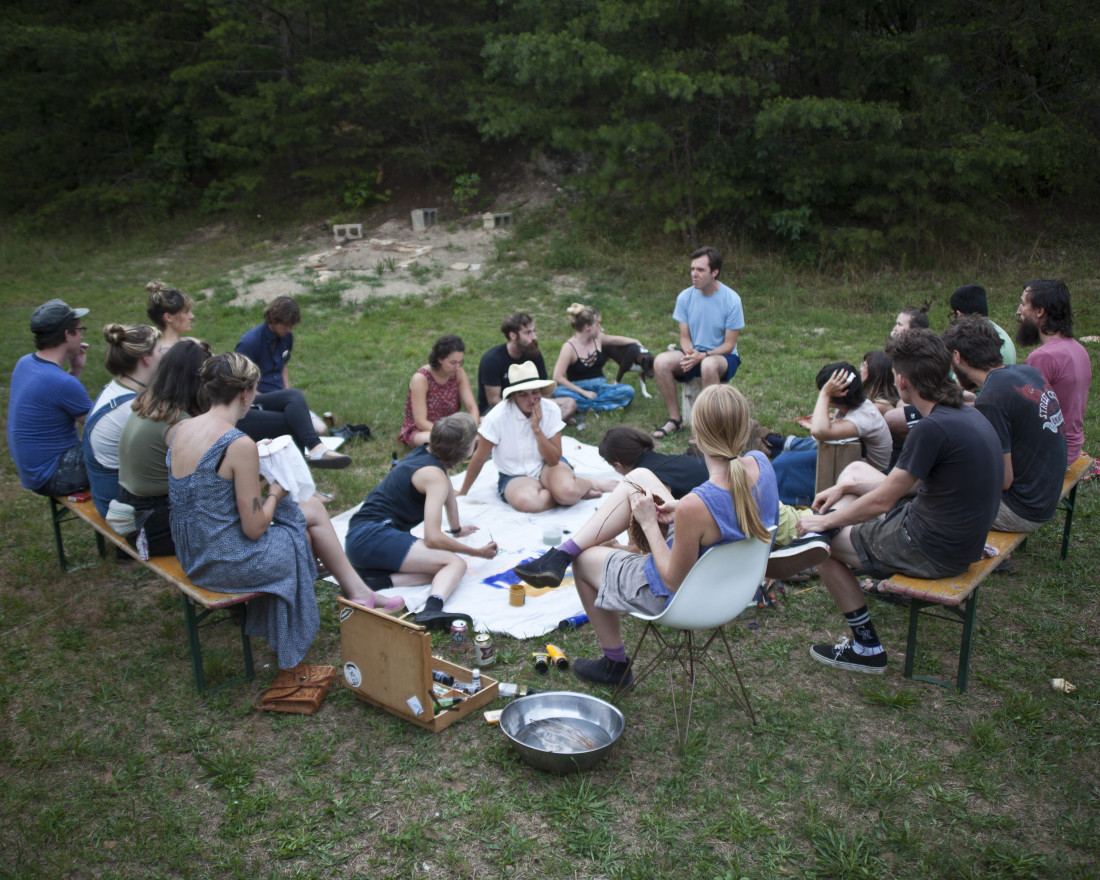As if to balance the digital age and its downsides of isolation and media overwhelm, craft programs are on the rise. Warren Wilson College recently announced its Master of Arts in Critical & Historical Craft Studies. This spring and summer, The Center for Craft continues its series of Friday night crafting events. And The Cabbage School in Little Sandy Mush has announced its first full season of workshops, which will launch in June.
“One of the things we were inspired to do differently [than other programs] was to teach these skills within the context of our ongoing lives and offer the classes in a way that weren’t just skill-based but also helped to usher in a shift of focus toward how the skills can integrate into a life already lived,” says Cabbage School founding member Jessica Green.
“I think the key is that we are folding varied educational approaches into a larger conversation of how and where we learn,” says fellow founding member Lydia See. She will lead a photography workshop that includes foundational analog and digital skills. “But we will also make site-specific cyanotypes and experimental photographic exposures using only the moon.”
See adds, “The range of skills which will be covered in the workshop is wide — from 19th-century processes to the present — but the learning process will be shaped by the rural location, immersive nature of the workshop and experimental context.”
That class, held Saturday, June 9, to Monday, June 11, kicks off the Cabbage School’s offerings. Other courses include Body Weather (“part aerobic workout dance party, part mind-body integration, our focus will be on coordination, motion, whole-body perception and embodied intimacy with self, other, environment and group,” according to the website), Pizza Oven Building, Coopering: Traditional Wooden Buckets, and more.
“We wanted to keep the course offerings limited this first year while still representing the diversity of disciplines and perspectives that we hope to represent as a school,” says Andy McFate, also a founding member. “We feel that it is important to let practice define us, so we want there to be enough space in our first season to allow us to learn and adapt.”
He continues, “We want our school to be a forum for conversation about community and practice. To us, that means inclusivity, honesty, consistency, mutual support, growth and resilience, among so many other things. I suppose our target audience is anyone who wants to join in that conversation, whether with affirmation, criticism or curiosity.”
The Cabbage School, which describes itself as a “rigorous skill-based fool school,” takes inspiration from educational communities such as Rural Studio (an undergraduate program of the School of Architecture, Planning and Landscape Architecture at Auburn University) and Black Mountain College. Like those models, The Cabbage School is located away from the city center and, as such, out of range of cellphone reception. There is no internet at the school, either, but there are 17 acres of pasture and forest with a creek and a large vegetable garden.
“The property itself is a primary character in the experience, [and] the sense of place is embedded in the process,” says See. “Being present without cell reception or internet access allows us to totally immerse ourselves in a very focused way. … Last summer, during our pilot session, one class built a library for the school, so I find myself looking up recipes in cookbooks, or using our thesaurus rather than Google. It seems like a small shift, but it absolutely makes a difference in the overall experience.”
One of Green’s hopes for the school is to offer “the simple possibility of a life lived without constant frenetic connectivity,” she says. “I want the Cabbage School to be a place where we plant the seeds for a time better than our own, where we rekindle a sense of heritage and being of this planet. … We started a school because we don’t believe that folks should abandon their lives and do something different. We thought of the Cabbage School like breath — folks come and breathe life and new ideas into this place, and they go back to their lives filled with the breath they encountered here.”
Green’s Wednesday, June 13-Sunday, June 17 workshop, Making/Practice, calls together “creative geeks and geniuses to encounter our autonomous authority and a rooted voice within our work.” Green is a weaver, but nonweavers are welcome.
And there are opportunities to experience The Cabbage School beyond its workshops. As the institute’s fourth founding member, Saralyn Bellmer, notes, “We want the school to be a place where all people feel welcome. It is important to us that we have community events, potlucks, work parties and an open invitation for absolutely anyone to be involved in the things we program. At the same time, we have an open door policy for new ideas or events coming from individuals or groups that want to collaborate with the school.”
“That’s part of what we mean when we talk about a resilient and dynamic community,” says McFate. “People coming to gather constantly, with opportunities for folks to engage in ways that feel accessible and meaningful to them.”
Learn more about The Cabbage School and find the complete list of workshops at thecabbageschool.net



Before you comment
The comments section is here to provide a platform for civil dialogue on the issues we face together as a local community. Xpress is committed to offering this platform for all voices, but when the tone of the discussion gets nasty or strays off topic, we believe many people choose not to participate. Xpress editors are determined to moderate comments to ensure a constructive interchange is maintained. All comments judged not to be in keeping with the spirit of civil discourse will be removed and repeat violators will be banned. See here for our terms of service. Thank you for being part of this effort to promote respectful discussion.